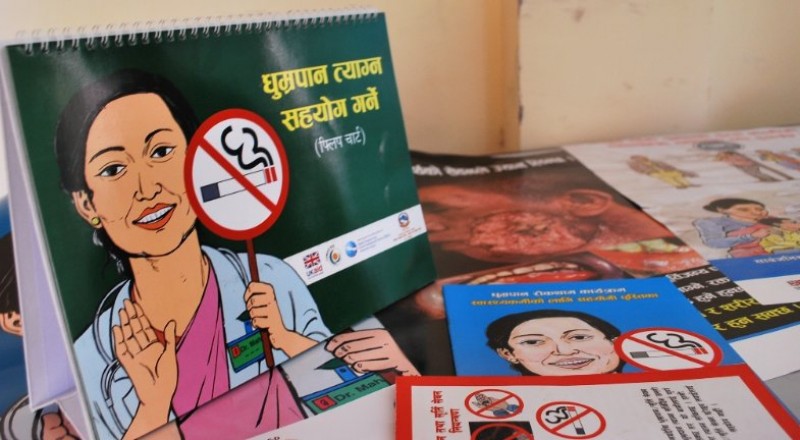As human beings, we have good habits and bad habits. We have categorised and internalised our habits as ‘good’ and ‘bad’ based on our societal norms and values. From the very small age, we are taught and reminded that tobacco consumption is a bad habit and is injurious to health. However, people do smoke and consume other forms of tobacco. Tobacco consumption is instigated by many factors. Young people and adolescents start smoking in order to look matured, due to peer pressure as well as out of curiosity. Adults may smoke due to mental stress caused by economic and personal problems while some may smoke to control weight or even for the sake of sheer pleasure.

Dr Sushil Baral, Executive Director of HERD receiving World No Tobacco Award 2015 from WHO Acting WHO Representative of Nepal
Changing Behaviour for Change in Behaviour
Is it that people who consume tobacco are not aware of its hazards? Certainly that’s not the case. It is one of people’s inhibitions that need to go through a complex process of realisation, will power and dedication. In some instances, smokers are looked down upon and constantly pressurised by the family members, in the neighbourhood and by the colleagues as it is considered a ‘social evil’. As a result, the users are left in a dilemma of the quick realisation to quit tobacco but not being able to take the next but very important step forward – the process of quitting. The BIG change required here was the BEHAVIOUR change. Changing behaviour for the change in behaviour was envisaged through a behaviour change intervention for smoking cessation.
From Individual Change to Systemic Change
For the BIG change, transformation in behaviour can only be possible if it is integrated within the government health system. For that, HERD started this 2-year feasibility project, ‘Development and Implementation of Behaviour Change Intervention for Smoking Cessation’ with the support of Ministry of Health and Population and COMDIS-HSD, a research consortium based in University of Leeds, UK. The modality was based on providing individual counselling to patients visiting the Primary Health Care Centres through the health workers and support staff from HERD. Counselling was provided through IEC materials and conducting follow up visits. This way, the project was designed not just to instigate the positive impact within the project time frame but to integrate the behaviour change intervention within the primary health care settings so that the behaviour change intervention packages continue even after the project ends.

IEC materials developed by HERD with the support of National Health Education, Information and Communication Centre (NHEICC) and COMDIS-HSD.
World No Tobacco Day Award 2015

HERD was awarded with World No Tobacco Award 2015 by WHO Acting WHO Representative of Nepal on June 5 at WHO Nepal Headquarters in Kathmandu.
Dr. Sushil Baral, Executive Director of HERD after receiving the award on behalf of HERD reflects back to earlier days how mission tobacco control began: “We have been working very closely in the sector of tobacco control in close coordination with the Ministry of Health and Population since our establishment in 2004. We started with the inter-linkage of tobacco users being vulnerable to tuberculosis. That was the inspiration for us to start the self-initiation towards working more in tobacco control activities. Our approach basically has been generating the evidence, informing the policy and changing the practice. We are proud that our small effort through the feasibility study intervention in the primary health care settings has been acknowledged by the ministry and the WHO.”
“It is a great moment for us as all the effort we have put in for tobacco control initiatives has finally paid off”, Sudeepa Khanal, Project Coordinator for tobacco control related projects at HERD said. Shraddha Manandhar, Research Officer, who observed and monitored the intervention in one of the primary health care centres in Kathmandu shares her experience, “It was challenging as it was behaviour change and we had to counsel the patients and at the same time coordinate with the health workers in their health facilities. We had to conduct several meetings and follow up sessions to finally come up with a successful result - 37% quit rate among smokers who received the intervention support. The wait has been worthwhile.”

Shraddha Manandhar and Sudeepa Khanal, all smiles receiving the award.
Our Efforts Continue
“The award gives us zeal to work all our available resources furthermore in the sector of tobacco control”, Dr. Baral stated as he shared about HERD planning to come up with more innovative projects on tobacco control particularly targeting for supporting government in effective implementation of banning tobacco consumption in public places.



Comments(0)
No comments found.